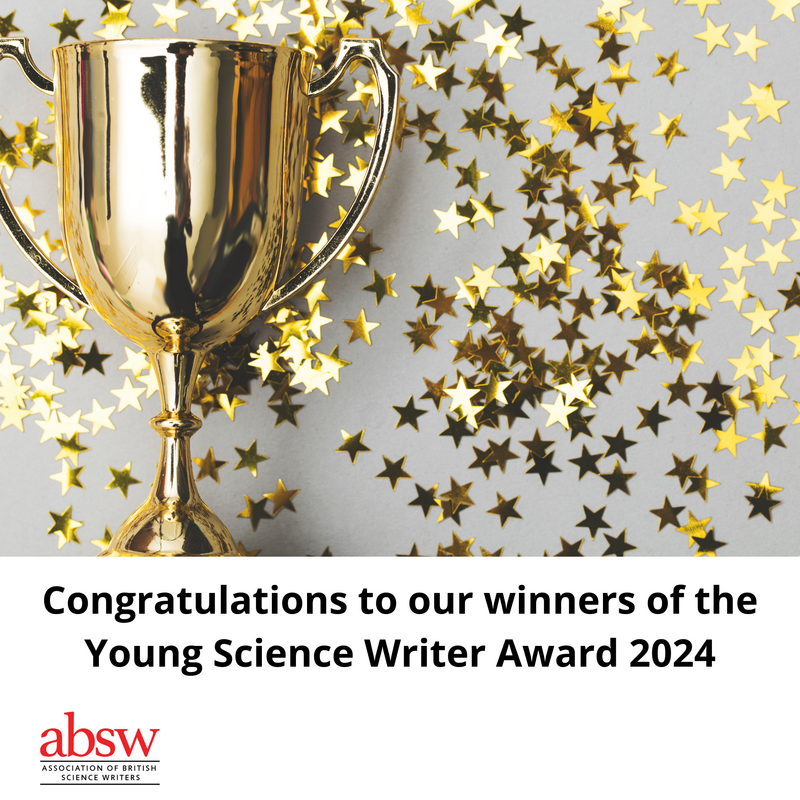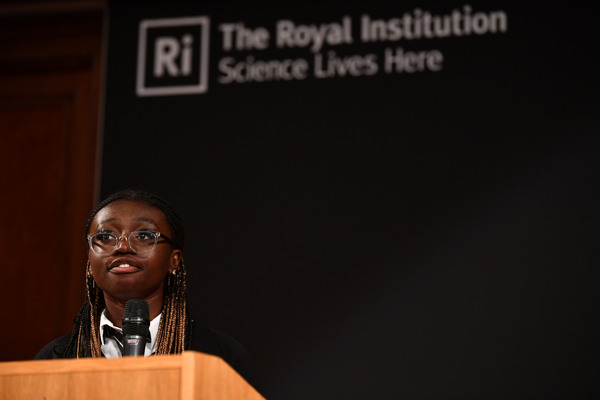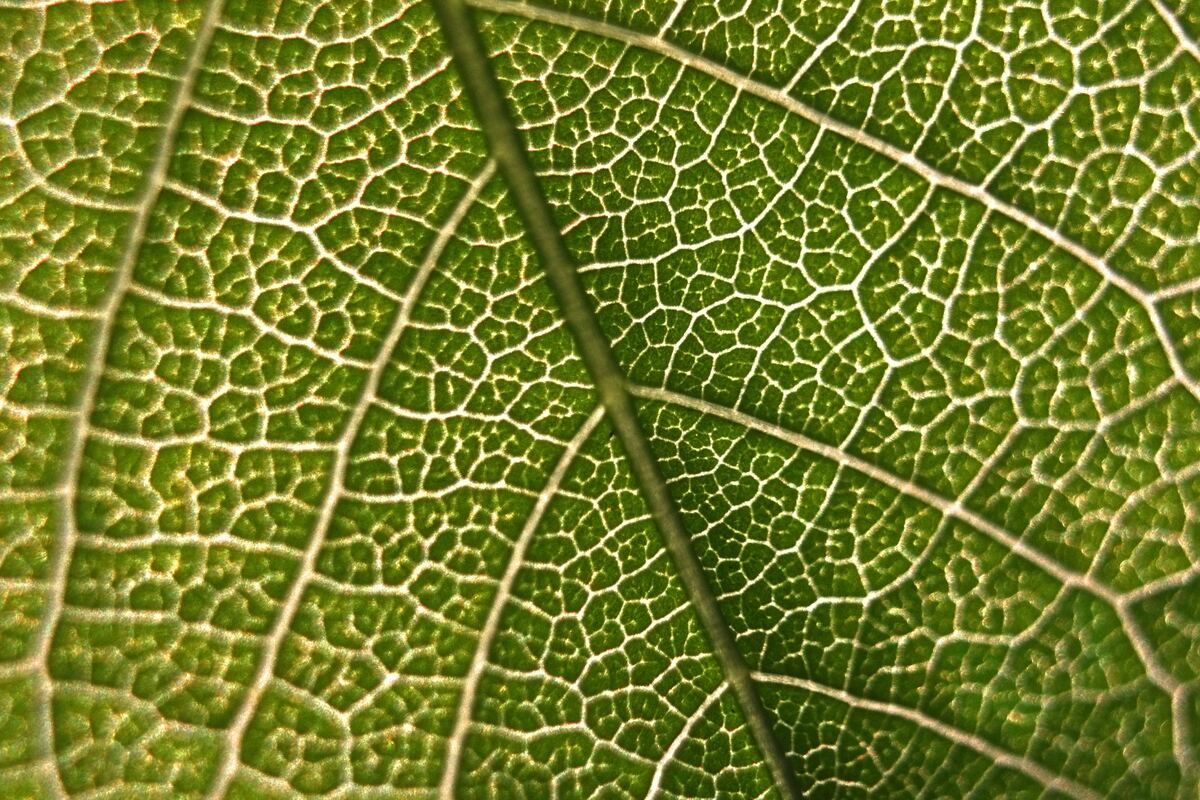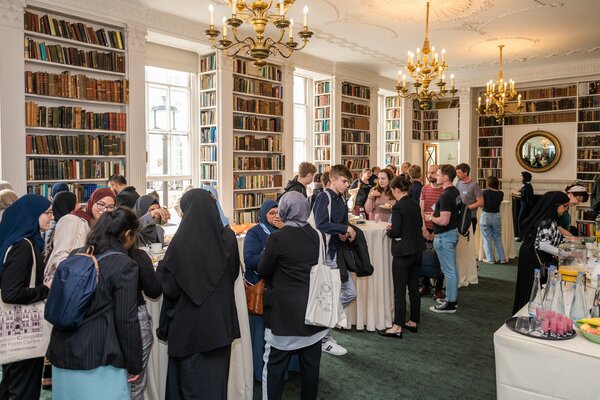
Announcing the Winners of the Young Science Writer 2024 Competition!
We are delighted to announce the winners of the Young Science Writer Award 2024. This year, we received an exceptional number of submissions from talented young writers across the UK. Each entry showcased remarkable creativity, scientific insight, and a passion for communicating complex ideas in an engaging and accessible way.
After careful consideration by our panel of judges, we are proud to present the winners:
First Place: Jasmin Notarangelo, Musselburgh Grammar School, East Lothian
Essay Title: "Are Insulin Pumps the Future of Type 1 Diabetes Management"
Jasmin's essay impressed us with its dedication to highlighting a pressing global issue. With its personal take on diabetes management and dedication to investigative journalism, this outstanding piece presented a compelling message about the accessibility of healthcare in the UK.
Runners-Up:
Anna Joby, The Swan School, Oxford
Essay Title: "The Negative Effects of Light Pollution"
Anna's entry was thoroughly researched featuring evidence from high quality sources. The piece presented a clear narrative on the negative effect of light pollution on a variety of populations and ended with a clear call to action.
Lissie Marsh, The Compton School, Barnet
Essay Title: "The Unseen Consequences of the Overuse of Tyres"
Lissie's submission stood out for its alternative take on the global issue of microplastics. This well-structured and thought-provoking essay presented hard-hitting statistics from reputable sources about the overuse of tyres and their substantial contribution to the pollution of our planet.
Highly Commended:
We would also like to acknowledge the following entrants for their outstanding contributions:
Aaila Ahmed, Eden Girls School, London. "The Illuminating World of Shrimpoluminescence".
Aaron Rae, Boclair Academy, Glasgow. "Bridging Humanity and Artificial Intelligence: Towards an Equitable Future".
Cerys Davies, North Berwick High School, East Lothian. "Science, Magic and Platypuses".
Eimaan Khan, Plashet, London. "Sleep: Essence, Evolution and the Perils of Deprivation".
Fatima Jamula, Plashet, London. "Ingredient Households, A Blessing in Disguise".
Harrison Alexander, The Buckingham School, Buckingham. "Cosmic Energy - Saving the Human Race!".
Jumana Al-Shibaany, Henley Bank High School, Gloucester. "The Future of Healing: AI's Journey in Transforming Healthcare".
Miranda Hume, Waldegrave School, Middlesex. "The Fragile Future of our Corner of Paradise".
Phoebe McIntosh, Tudor Grange Academy, Worcecter. "Satellites: The Pyramids we didn't want to Build".
Rimzim Baser, Sarah Bonnell School, London. "GeneGenius: Revolutionising Healthcare through Advanced Gene Therapy".
Congratulations to all the winners!
Thank you to everyone who participated in the Young Science Writer 2024 competition. Your passion for science and dedication to science writing and communication are truly inspiring. We encourage all entrants to continue writing and exploring the wonders of science!
The ABSW is currently seeking sponsors for the Young Science Writer Award 2024. This is a national competition reaching secondary schools across the UK with the aim of nurturing the talents of young people with a passion STEM. Please consider supporting our aims for the award and get in touch with our YSWA manager Maisie Keogh at [email protected]. You can download our support brochure to find out more.

Could you be the next ABSW National Young Science Writer of the year?
Who and what?
The Association of British Science Writers invites students from non-selective state funded schools, or those who are home schooled with disabilities and who cannot attend school in person, aged 14-16 years, to submit an 800-word essay on any subject in science, technology, engineering and/or mathematics.
This competition is open to students nationally in England, Northern Ireland, Scotland and Wales.
This competition is designed to get young people writing and thinking about the big questions in science, technology, engineering and maths, with a focus on how science impacts on policymaking and society.
Criteria for Entry:
1. You must be aged 14-16 years old;
2. You MUST be attending a state funded AND non-selective school in the UK.
What are we looking for?
Great storytelling. We would love the essay to be an enlightening, informative and engaging read. We would also like it to include analysis, context, and perspective, helping the reader explore and understand the social, ethical, and political implications of scientific advances and the scientific process. This year, we will also have available a few informative videos to help, which will feature experienced science journalists sharing some of their tips on what makes a compelling and impactful story.
Award Categories
In 2024 we are introducing five award categories to which you can align your essay to:
- Climate & Environment
- AI & Technology
- Engineering the Future
- Healthcare & Life Science
- Maths & Physical Sciences
The Young Science Writer 2024 Award has now closed for submissions. We will announce the winners on Wednesday 29th of May.
What should you write about?
We are keen to hear about whatever STEM topics you are passionate about; it can be anything from the role of AI in societies of the future to the importance of meeting our net zero goals in the next decade.
Here are some ideas on types of questions that could guide your essays:
- How far away are settlements on Mars from becoming reality?
- Should those who make science policy be scientists?
- How is fast fashion contributing to the climate emergency?
- What are the materials of the future and how could they be used to house growing populations?
And finally here are some questions for you to consider when thinking about the content of the essay:
- How does the subject you choose relate to society?
- Who are the winners and losers of scientific advance in this area?
- What role should the public play in policymaking in this area?
Please be aware, we check all essays using AI detection software. If it is discovered that your submission has been written with the help of an AI-based tool, it may be disqualified from the competition.

How to Write an Engaging and Informative Essay
There are several things to consider when writing an essay which is educational, compelling and impactful.
1. Chose a topic which you find interesting - It is much easier to write an essay on a topic you are passionate about. You can find inspirational from many reputable sources from newspapers and online news sites, to academic journals and books. You might even come across content on social media which piques your interest and you might like to do further research into (we will share some tips about using social media as a source of information later on).
Top Tip: Sites such as New Scientist, Scientific American, Chemistry World and Quanta are all examples of reputable science publications although there are many more examples of excellent science journalism available.
2. Research extensively - Unless the topic which you have chosen to write about is brand new and pushing the frontiers of science, you will likely encounter a large number of resources that you can access to find out more about it. We highly recommend researching your topic broadly to ensure you are considering multiple viewpoints but also with depth, so that you fully understand what the subject is about.
For example, you might come across a video on TikTok which discusses an interesting chemical reaction - the thermite reaction. You then do a quick online search where you find that several reputable news outlets have recently written about this in relation to new sustainable methods of energy production. You then use a website such as ScienceDirect to find some peer-reviewed academic journal papers to dive into this topic in more depth.
3. Think of your audience and the message you are trying to share - All areas of science, technology, engineering and maths (STEM) contain technical jargon specific to that subject. However, if your audience does not have a background in that area, it will make it challenging for them to understand. Help to make the essay more accessible to a general audience by explaining technical terms. What do you want the audience to do once they have read your essay - do you want them to take action? Or do you want to inspire them to learn more about a particular subject?
For example, your essay might discuss advances in AI and robotics and how they can be integrated into devices used in healthcare. This subject raises several ethical questions which you may want your reader to consider. Perhaps you are trying to make a persuasive argument as to why these advances should be implemented more quickly - they might save lives. Perhaps there has been a recent change in policy which prevents the use of such devices within the NHS and you are keen to influence your audience to lobby for this to be changed. Whatever your message is, it should be concise and set the tone for a cohesive narrative.
4. Support your writing with evidence - If you make an argument in your essay you must provide evidence for this. The use of statistics and data really helps to strengthen the point you are making - but, only if you can back it up. Using reputable sources and properly referencing will help you to avoid plagiarism (passing someone else's work off as your own). Avoid using information you have gathered on social media. Instead, search for reputable sites which tell you the source of the information.
Top Tip: There are several types of referencing systems but you only need to choose one to use. Whatever one you decide to use, remain consistent and use it throughout your essay.
We will be sharing a series of helpful videos created by ABSW science journalists and writers. These will be made available shortly and will provide tips and tricks to crafting a compelling piece of writing.
Photo Credit: Vadim Gromov on Unsplash
The Award
1st prize: £1000 + Visit to BBC Science HQ in Cardiff + 1 year Young Ri membership
2nd & 3rd prize: £250 + 1 year Young Ri membership
Commended Prizes: An additional 10 students will receive a commendation prize of £100 each. The commended entrants will also be invited to the awards ceremony to be presented with their certificates.
The prize money will be transferred to the winning entrants, to help support their personal development. The winner, runners-up and their entire classes will be invited to the Awards Ceremony held at The Royal Institution in 24th June 2024. A contribution to travelling costs for the winner will be available.
In addition, the winning student will participate in an exclusive visit to BBC Science HQ in Cardiff to meet with an experienced Science Journalist. They will receive a coaching session where they will have the opportunity to discover what a career in science writing/journalism entails. They will also be able to observe various types of science media being produced, providing a comprehensive overview of what it is like working in this exciting area of STEM!
Please note: The winner will be allowed to bring a maximum of two other individuals with them during their visit to BBC Science HQ in Cardiff, one of whom must be a parent/guardian.
The winning essay will be published on the BBC Science news website at the end of 2024 and will include a mention of their school. The two runner-up entries will be published on the ABSW and The Royal Institution websites.
How to apply
Write an essay of up to 800 words (this does not include references) and submit it via this website by 5pm GMT Monday 18th March.
Alongside your essay, we will ask some additional questions which will help us review your submission. You can access this form by clicking on the 'Submit your essay' button below.
Please note that the winner and runners up will need permission from their parent/guardian before any details about them can be made publicly available.
We also ask that you make your school aware you have entered the competition. Should you be selected as a winner or runner-up, we will invite you and your class to our awards ceremony and we will need a point of contact within your school to arrange this with.
Submissions must be in English.

Who is eligible to participate in this contest?
In 2024 the competition is open to students from non-selective state funded schools and who are home-schooled, aged 14-16 years, across the UK.
Can I submit a previously published essay (i.e. in my school newspaper)?
No. We ask that your essay be original for this competition. Please don’t submit anything you have already published at the time of submission, whether in a school newspaper, for another contest or anywhere else.
Who can I contact if I have questions about this competition or I am having issues submitting my entry?
Please contact YSWA project manager Maisie Keogh at [email protected]
Frequently asked questions
Who will judge my essay?
A detailed list with names will be published after the submission closing date. The judges will include science journalists and editors from the ABSW and from institutions across the world.
How will my essay be judged?
It will be judged on:
- Clarity of writing. As you have 800 words or fewer to write for a general audience you will need to make sure your essay is focused enough to be clear and concise.
- Supporting evidence. Citing sources and including references to studies for example.
- Language and style. Are you telling a captivating and engaging story. For example: Does your opening paragraph hook the reader?
Can I take part if I am home-schooled?
Yes, those teenagers who are home-schooled due to disability are most welcome to submit an essay - please let us know if this is the case in the school name and address section of the form.
Am I a student at an eligible school?
If your school is listed on a Council website and is a non-selective state funded school, then it meets the eligibility criteria.
For teachers:
How do my students prove to me that they entered this contest?
After students submit their essays they will receive an email that will confirm that their submission has been received. This will happen once the competition has closed.
Resources for Teachers and Students
The award is funded by Alex and Jeff O'Brien. With generous support by the BBC and the Royal Institution.




